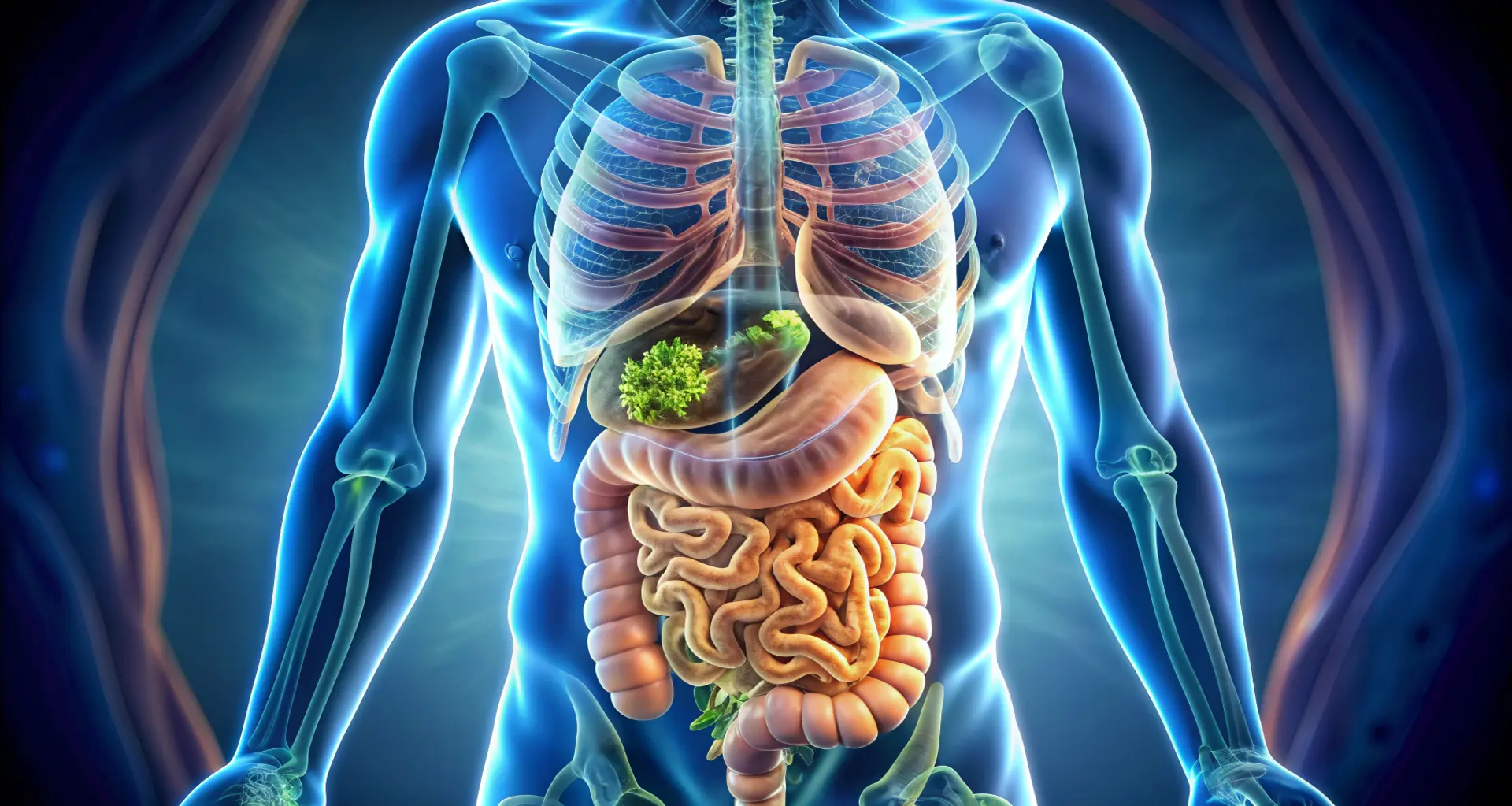Do you want to boost your gut health by 500%? Learn the best time to take probiotics and how to optimize their absorption and efficacy in this comprehensive guide.
Contents
- 1 Introduction
- 2 Understanding Probiotics
- 3 The Gut-Brain Connection
- 4 Timing Matters: Best Times to Take Probiotics
- 5 Enhancing Probiotic Absorption
- 6 Lifestyle Factors and Gut Health
- 7 Customizing Your Probiotic Regimen
- 8 Conclusion
- 9 FAQs
- 10 What are probiotics and why are they good for gut health?
- 11 When is the best time to take probiotics?
- 12 How can I enhance the absorption of probiotics?
- 13 How can I improve my gut health with lifestyle factors?
- 14 How can I customize my probiotic regimen according to my individual needs and health conditions?
Introduction
Are you maximizing the benefits of your probiotics, or could you be missing out on a gut health revolution? If you are taking probiotics regularly, you are already doing something good for your body. But did you know that the timing of your probiotic consumption can make a huge difference in how effective they are?
Gut health is not just about digestion. It is also linked to your immune system, your mood, your brain function, and your overall well-being. Probiotics are live microorganisms that can improve your gut health by balancing your gut microbiome, the community of bacteria and other microbes that live in your intestines. However, not all probiotics are the same, and not all times are ideal for taking them.
In this article, you will learn about the optimal timings for taking probiotics to achieve a 500% boost in gut health. You will also discover how to enhance your probiotic absorption, how to customize your probiotic regimen, and how to incorporate lifestyle factors that support a healthy gut. By the end of this article, you will have the knowledge and the tools to revolutionize your gut health and your overall well-being.
Understanding Probiotics
Before we dive into the best times to take probiotics, let’s first understand what probiotics are and how they work.
What Are Probiotics?
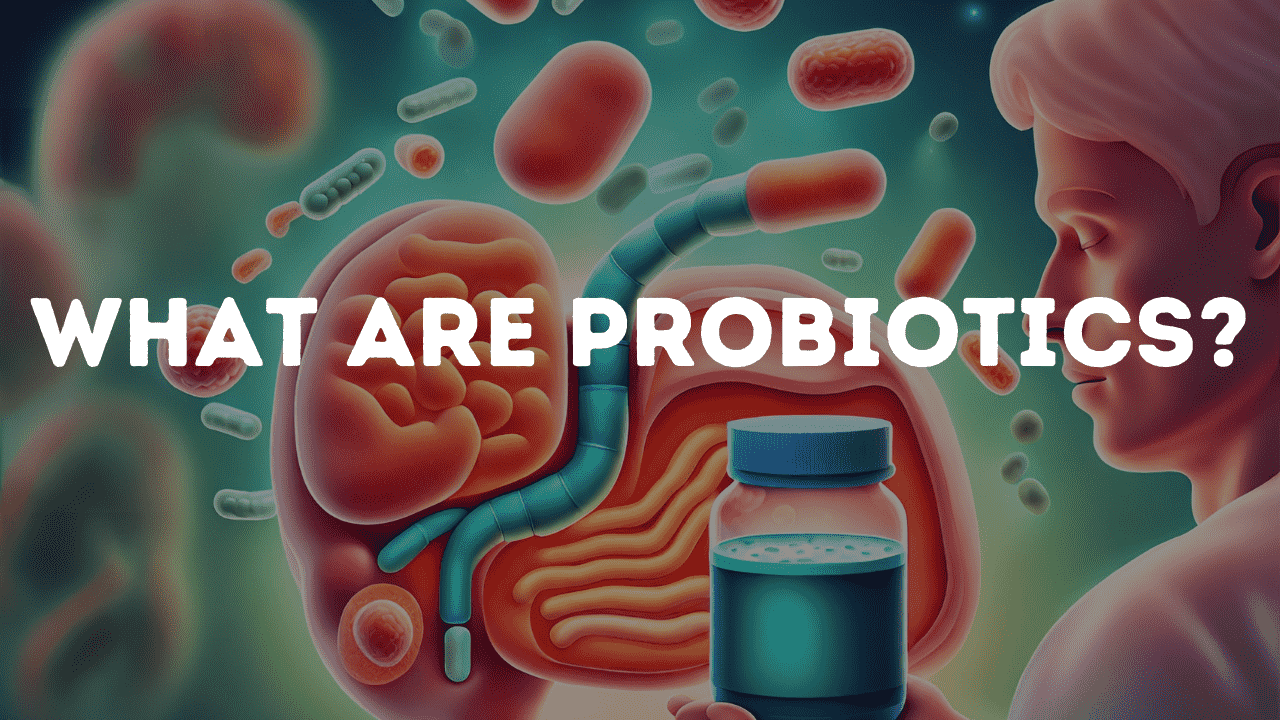
Probiotics are live microorganisms that can confer health benefits to the host when consumed in adequate amounts. They are usually bacteria, but can also include yeasts and other fungi. Probiotics can be found in fermented foods, such as yogurt, kefir, sauerkraut, kimchi, and kombucha, or in dietary supplements, such as capsules, tablets, powders, and liquids.
Probiotics work by colonizing the gut and interacting with the resident microbes, the host cells, and the immune system. They can modulate the gut microbiome by enhancing the growth and activity of beneficial bacteria, inhibiting the growth and activity of harmful bacteria, and producing substances that can influence the gut environment, such as short-chain fatty acids, vitamins, and enzymes.
Probiotics can improve gut health by:
- Supporting digestion and nutrient absorption.
- Enhancing the intestinal barrier function and preventing leaky gut.
- Regulating the immune system and preventing infections and inflammation.
- Modulating the gut-brain axis and influencing mood and cognition.
Probiotic Strains
Not all probiotics are the same. Different probiotics have different characteristics, functions, and effects. Probiotics are classified by their genus, species, and strain. For example, Lactobacillus rhamnosus GG is a probiotic strain that belongs to the genus Lactobacillus and the species rhamnosus.
The strain level is the most important factor when choosing a probiotic, as different strains can have different benefits and suitability for different conditions. For example, Lactobacillus rhamnosus GG has been shown to prevent and treat diarrhea, reduce the risk of respiratory infections, and improve eczema, while Lactobacillus acidophilus NCFM has been shown to lower cholesterol, improve lactose intolerance, and prevent vaginal infections.
Some of the most common and well-studied probiotic strains are:
| Genus | Species | Strain | Benefits |
|---|---|---|---|
| Lactobacillus | rhamnosus | GG | Prevents and treats diarrhea, reduces the risk of respiratory infections, improves eczema |
| Lactobacillus | acidophilus | NCFM | Lowers cholesterol, improves lactose intolerance, prevents vaginal infections |
| Lactobacillus | casei | Shirota | Enhances immune function, prevents constipation, reduces the risk of colorectal cancer |
| Lactobacillus | plantarum | 299v | Improves irritable bowel syndrome, ulcerative colitis, and Crohn’s disease, reduces inflammation and oxidative stress |
| Bifidobacterium | lactis | HN019 | Boosts immune function, prevents and treats diarrhea, improves bone health |
| Bifidobacterium | longum | BB536 | Improves allergic rhinitis, constipation, and cognitive function, lowers cholesterol and blood pressure |
| Bifidobacterium | animalis | DN-173 010 | Reduces abdominal pain and bloating, improves transit time and stool frequency, enhances immune function |
| Bifidobacterium | bifidum | MIMBb75 | Improves irritable bowel syndrome, reduces inflammation and intestinal permeability, prevents infections |
| Saccharomyces | boulardii | CNCM I-745 | Prevents and treats diarrhea, especially antibiotic-associated diarrhea and Clostridium difficile infection, improves inflammatory bowel disease and Helicobacter pylori infection |
When choosing a probiotic supplement, look for the following information on the label:
- The name of the probiotic strain (e.g., Lactobacillus rhamnosus GG).
- The number of live microorganisms per dose (e.g., 10 billion CFU, or colony forming units).
- The expiration date and storage instructions.
- The health claims and evidence to support them.
- The contact information of the manufacturer.
The Gut-Brain Connection

One of the most fascinating aspects of gut health is its connection to the brain. The gut and the brain communicate with each other through a complex network of nerves, hormones, neurotransmitters, and immune molecules, known as the gut-brain axis. This bidirectional communication affects not only the digestive function, but also the mood, cognition, and behavior of the host.
Gut-Brain Axis
The gut-brain axis consists of several components, such as:
- The enteric nervous system (ENS), which is the network of nerves that innervate the gastrointestinal tract and regulate its motility, secretion, and blood flow.
- The vagus nerve, which is the main nerve that connects the brain and the gut, and transmits signals in both directions.
- The hypothalamic-pituitary-adrenal (HPA) axis, which is the central stress response system that involves the brain and the adrenal glands, and produces hormones such as cortisol and adrenaline.
- The immune system, which is the defense system that protects the body from pathogens and foreign substances, and produces inflammatory cytokines and antibodies.
- The microbiota-gut-brain axis, which is the interaction between the gut microbiome and the brain, mediated by microbial metabolites, neurotransmitters, and hormones.
The gut-brain axis is involved in various physiological and psychological processes, such as:
- Appetite and satiety.
- Digestion and absorption.
- Pain and inflammation.
- Mood and emotion.
- Memory and learning.
- Stress and anxiety.
- Depression and autism.
Probiotics and Mood
Probiotics can influence the mood and mental well-being of the host by modulating the gut-brain axis. Probiotics can:
- Produce and release neurotransmitters, such as serotonin, dopamine, and gamma-aminobutyric acid (GABA), which are involved in mood regulation and emotional stability.
- Alter the expression and function of receptors and transporters for neurotransmitters in the brain and the gut, affecting their availability and signaling.
- Reduce the production and release of stress hormones, such as cortisol and adrenaline, which can induce anxiety and depression.
- Lower the levels of inflammatory cytokines, such as interleukin-6 and tumor necrosis factor-alpha, which can impair brain function and induce neuroinflammation.
- Enhance the integrity and function of the intestinal barrier, preventing the leakage of toxins and pathogens into the bloodstream, which can trigger systemic inflammation and neurotoxicity.
- Stimulate the vagus nerve, which can activate the parasympathetic nervous system and induce relaxation and calmness.
Some of the probiotic strains that have been shown to improve mood and mental health are:
| Genus | Species | Strain | Benefits |
|---|---|---|---|
| Lactobacillus | helveticus | R0052 | Reduces stress and anxiety, improves cognitive function and memory |
| Lactobacillus | rhamnosus | JB-1 | Reduces stress and anxiety, enhances GABA signaling |
| Lactobacillus | casei | CRL-431 | Improves mood and depression, lowers cortisol levels |
| Bifidobacterium | longum | R0175 | Reduces stress and anxiety, improves cognitive function and memory |
| Bifidobacterium | infantis | 35624 | Reduces depression and inflammation, improves irritable bowel syndrome |
| Bifidobacterium | breve | B-3 | Improves mood and depression, lowers cortisol levels |
Timing Matters: Best Times to Take Probiotics
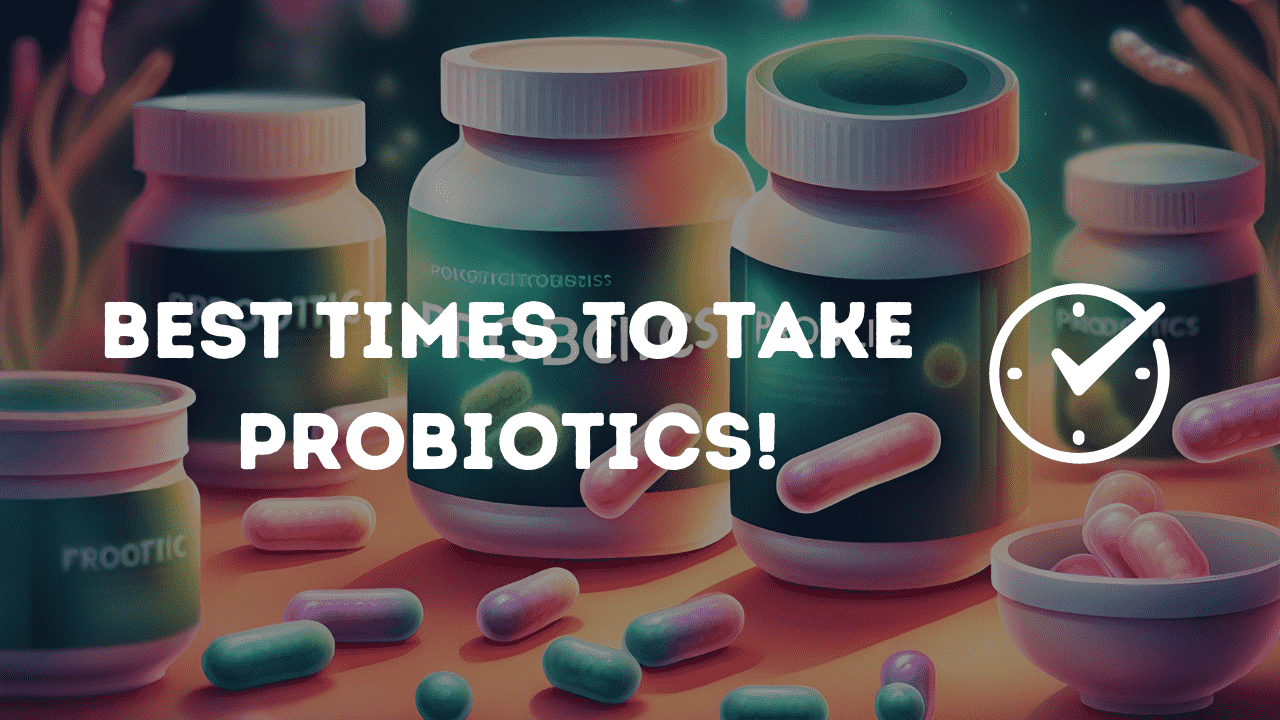
Now that you know what probiotics are and how they can benefit your gut health and your brain health, you might be wondering when is the best time to take them. The answer is not so simple, as different factors can affect the survival and efficacy of probiotics, such as the acidity of the stomach, the presence of food, and the type of probiotic.
Morning vs. Evening
One of the common questions about probiotic timing is whether it is better to take them in the morning or in the evening. The rationale behind taking probiotics in the morning is that the stomach is less acidic and more empty, which can allow more probiotics to reach the intestines alive. The rationale behind taking probiotics in the evening is that the gut transit time is slower and the gut microbiome is more active, which can enhance the colonization and function of probiotics.
However, there is no definitive answer to this question, as different studies have shown conflicting results. Some studies have found that taking probiotics in the morning can increase their survival and efficacy, while others have found that taking probiotics in the evening can have the same or better effects. The discrepancy may be due to the differences in the probiotic strains, doses, formulations, and methods of measurement used in the studies.
Therefore, the best time to take probiotics may depend on the individual preferences and needs of the user, as well as the characteristics of the probiotic product. Some general guidelines are:
- If you are taking a probiotic supplement that is enteric-coated or microencapsulated, which can protect the probiotics from the stomach acid, you can take it at any time of the day, as long as you are consistent.
- If you are taking a probiotic supplement that is not enteric-coated or microencapsulated, you may want to take it in the morning, preferably 15 to 30 minutes before breakfast, when the stomach is less acidic and more empty.
- If you are taking a probiotic supplement that contains strains that are more resistant to the stomach acid, such as Lactobacillus and Bifidobacterium, you can take it at any time of the day, as long as you are consistent.
- If you are taking a probiotic supplement that contains strains that are more sensitive to the stomach acid, such as Saccharomyces and Bacillus, you may want to take it in the evening, preferably 2 to 3 hours after dinner, when the gut transit time is slower and the gut microbiome is more active.
- If you are taking a probiotic supplement that is designed for a specific condition, such as irritable bowel syndrome, ulcerative colitis, or depression, you may want to follow the instructions of the manufacturer or your healthcare provider, as they may have specific recommendations for the optimal timing of the probiotic consumption.
Pre vs. Post-Meal
Another common question about probiotic timing is whether it is better to take them before or after meals. The rationale behind taking probiotics before meals is that the food can act as a buffer and reduce the acidity of the stomach, which can increase the survival of the probiotics. The rationale behind taking probiotics after meals is that the food can provide nutrients and substrates for the probiotics, which can enhance their growth and function.
Again, there is no definitive answer to this question, as different studies have shown conflicting results. Some studies have found that taking probiotics before meals can increase their survival and efficacy, while others have found that taking probiotics after meals can have the same or better effects. The discrepancy may be due to the differences in the probiotic strains, doses, formulations, and methods of measurement used in the studies.
Therefore, the best time to take probiotics may depend on the individual preferences and needs of the user, as well as the characteristics of the probiotic product. Some general guidelines are:
- If you are taking a probiotic supplement that is enteric-coated or microencapsulated, which can protect the probiotics from the stomach acid, you can take it before or after meals, as long as you are consistent.
- If you are taking a probiotic supplement that is not enteric-coated or microencapsulated, you may want to take it before meals, preferably 15 to 30 minutes before breakfast or lunch, when the stomach is less acidic and more empty.
- If you are taking a probiotic supplement that contains strains that are more resistant to the stomach acid, such as Lactobacillus and Bifidobacterium, you can take it before or after meals, as long as you are consistent.
- If you are taking a probiotic supplement that contains strains that are more sensitive to the stomach acid, such as Saccharomyces and Bacillus, you may want to take it after meals, preferably 2 to 3 hours after breakfast or lunch, when the stomach is less acidic and more full.
- If you are taking a probiotic supplement that is designed for a specific condition, such as irritable bowel syndrome, ulcerative colitis, or depression, you may want to follow the instructions of the manufacturer or your healthcare provider, as they may have specific recommendations for the optimal timing of the probiotic consumption.
Enhancing Probiotic Absorption
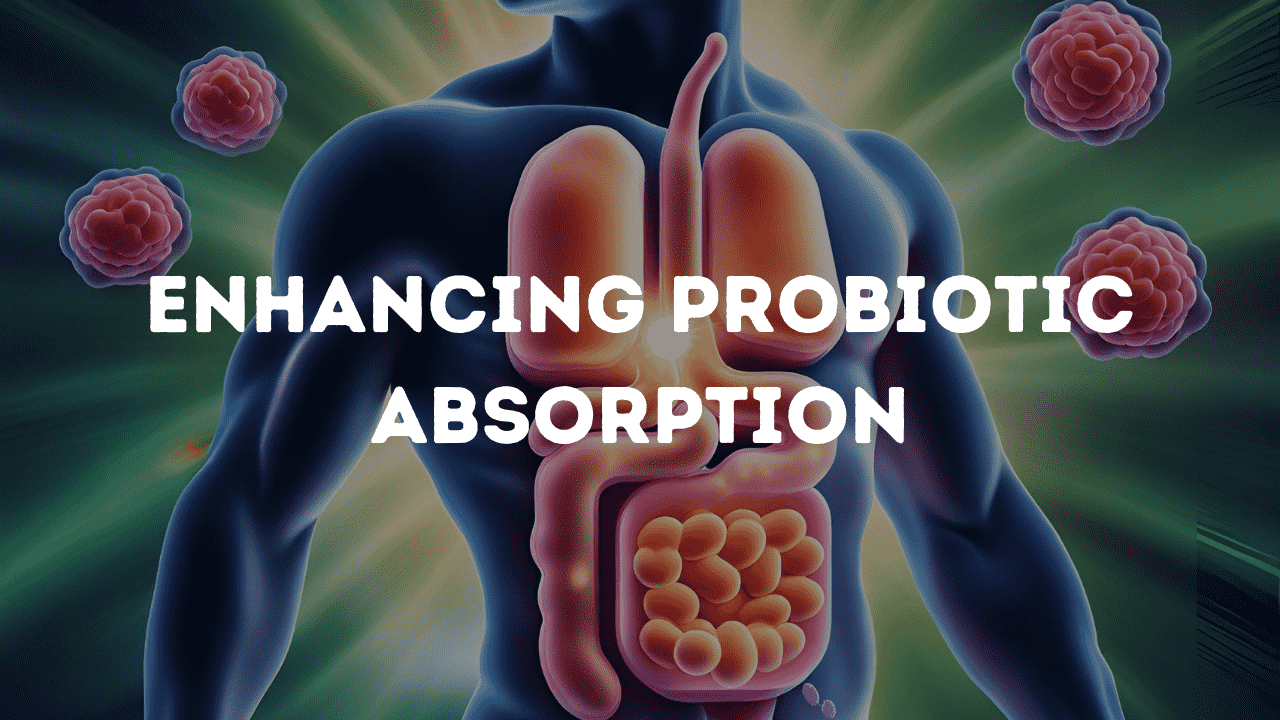
Besides the timing of probiotic consumption, there are other factors that can affect the absorption and efficacy of probiotics, such as the enhancers and inhibitors of probiotic absorption, and the strategies for maximized absorption.
Enhancers and Inhibitors of Probiotic Absorption
Some of the factors that can enhance or inhibit the absorption of probiotics are:
- Food: Food can act as a buffer and reduce the acidity of the stomach, which can increase the survival of the probiotics. Food can also provide nutrients and substrates for the probiotics, which can enhance their growth and function. However, some foods can also contain substances that can inhibit the growth and function of probiotics, such as antibiotics, preservatives, and artificial sweeteners.
- Beverages: Beverages can also act as a buffer and reduce the acidity of the stomach, which can increase the survival of the probiotics. Beverages can also provide fluids and electrolytes for the probiotics, which can enhance their hydration and viability. However, some beverages can also contain substances that can inhibit the growth and function of probiotics, such as alcohol, caffeine, and carbonated drinks.
- Medications: Medications can have various effects on the absorption of probiotics, depending on the type, dose, and timing of the medication. Some medications can reduce the acidity of the stomach, such as antacids and proton pump inhibitors, which can increase the survival of the probiotics. Some medications can increase the acidity of the stomach, such as non-steroidal anti-inflammatory drugs and corticosteroids, which can decrease the survival of the probiotics. Some medications can also directly kill or inhibit the growth and function of probiotics, such as antibiotics, antifungals, and antivirals.
Strategies for Maximized Absorption
Some of the strategies that can maximize the absorption of probiotics are:
- Choose a high-quality probiotic supplement that contains the right strains, doses, and formulations for your needs and goals. Look for products that are enteric-coated or microencapsulated, which can protect the probiotics from the stomach acid. Look for products that have a long shelf life and are stored properly, which can ensure the viability of the probiotics. Look for products that have scientific evidence and health claims to support their efficacy and safety.
- Take your probiotic supplement at the optimal time of the day, according to the guidelines discussed in the previous section. Be consistent with your probiotic regimen and do not skip or change your doses without consulting your healthcare provider.
- Avoid or limit the intake of foods, beverages, and medications that can inhibit the absorption of probiotics, such as antibiotics, preservatives, artificial sweeteners, alcohol, caffeine, and carbonated drinks. If you have to take these substances, try to space them out from your probiotic consumption by at least 2 to 3 hours.
- Consume foods and beverages that can enhance the absorption of probiotics, such as fermented foods, prebiotic foods, and water. Fermented foods, such as yogurt, kefir, sauerkraut, kimchi, and kombucha, can provide additional probiotics and synergize with your probiotic supplement. Prebiotic foods, such as bananas, onions, garlic, asparagus, and oats, can provide fibers and sugars that can feed and stimulate the growth and function of probiotics. Water can provide hydration and electrolytes that can improve the viability and activity of probiotics.
Lifestyle Factors and Gut Health
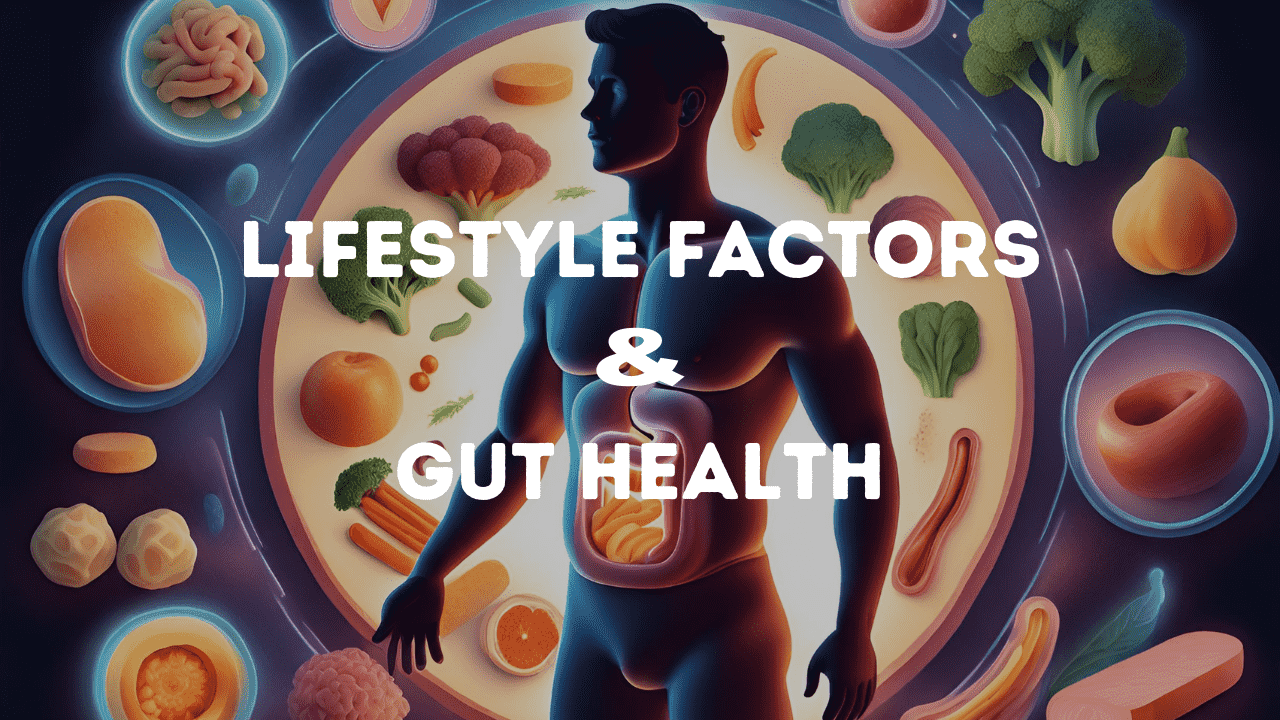
Besides taking probiotics, there are other lifestyle factors that can affect your gut health, such as exercise and stress management. These factors can influence the composition and function of your gut microbiome, as well as the communication between your gut and your brain.
Exercise and Gut Health
Exercise is one of the best things you can do for your gut health and your overall health. Exercise can:
- Increase the diversity and richness of your gut microbiome, which can improve your digestion, immunity, and metabolism.
- Increase the production and release of short-chain fatty acids, such as butyrate, which can nourish your gut cells, enhance your intestinal barrier function, and modulate your immune system and inflammation.
- Increase the production and release of endorphins, which can improve your mood, reduce your stress, and stimulate your vagus nerve and your gut-brain axis.
- Reduce the risk of obesity, diabetes, cardiovascular disease, and cancer, which can impair your gut health and your overall health.
Some of the tips for exercising for gut health are:
- Aim for at least 150 minutes of moderate-intensity aerobic exercise per week, such as brisk walking, jogging, cycling, or swimming, or 75 minutes of vigorous-intensity aerobic exercise per week, such as running, sprinting, or skipping.
- Include some strength training exercises at least twice a week, such as lifting weights, doing push-ups, or using resistance bands, which can build your muscle mass, strength, and endurance.
- Include some flexibility and balance exercises at least twice a week, such as stretching, yoga, or tai chi, which can improve your posture, mobility, and stability.
- Choose an exercise that you enjoy and that suits your fitness level, goals, and preferences. You can also vary your exercise routine to keep it fun and challenging.
- Listen to your body and do not overexert yourself. If you feel pain, discomfort, or fatigue, stop and rest. If you have any medical conditions or injuries, consult your healthcare provider before starting or changing your exercise program.
Stress Management
Stress is one of the worst enemies of your gut health and your overall health. Stress can:
- Disrupt the balance and function of your gut microbiome, reducing the diversity and richness of beneficial bacteria, and increasing the growth and activity of harmful bacteria.
- Impair the integrity and function of your intestinal barrier, increasing the leakage of toxins and pathogens into the bloodstream, which can trigger systemic inflammation and neurotoxicity.
- Activate the hypothalamic-pituitary-adrenal (HPA) axis, increasing the production and release of stress hormones, such as cortisol and adrenaline, which can induce anxiety and depression.
- Alter the production and release of neurotransmitters, such as serotonin, dopamine, and gamma-aminobutyric acid (GABA), which can affect your mood, cognition, and behavior.
- Interfere with the communication between your gut and your brain, impairing the gut-brain axis and its physiological and psychological effects.
Some of the tips for managing stress for gut health are:
Customizing Your Probiotic Regimen
- Identify and avoid or reduce the sources of stress in your life, such as work, relationships, finances, or health issues. If you cannot avoid or reduce them, try to cope with them in a positive and constructive way, such as seeking support, finding solutions, or changing your perspective.
- Practice relaxation techniques, such as deep breathing, meditation, mindfulness, or progressive muscle relaxation, which can calm your mind and body, lower your blood pressure and heart rate, and reduce your cortisol and adrenaline levels.
- Engage in hobbies and activities that bring you joy and satisfaction, such as reading, writing, painting, gardening, or playing music, which can boost your endorphins and serotonin levels, and improve your mood and creativity.
- Maintain a healthy and balanced diet, rich in probiotics, prebiotics, and fiber, which can nourish and support your gut health and your brain health. Avoid or limit foods and beverages that can harm your gut health and your brain health, such as processed foods, refined sugars, trans fats, alcohol, caffeine, and carbonated drinks.
- Get enough and quality sleep, which can restore and rejuvenate your body and mind, regulate your circadian rhythm and your hormones, and improve your memory and learning. Aim for at least 7 to 9 hours of uninterrupted sleep per night, and follow a regular sleep schedule. Avoid or limit factors that can disrupt your sleep, such as blue light, noise, temperature, or stress.
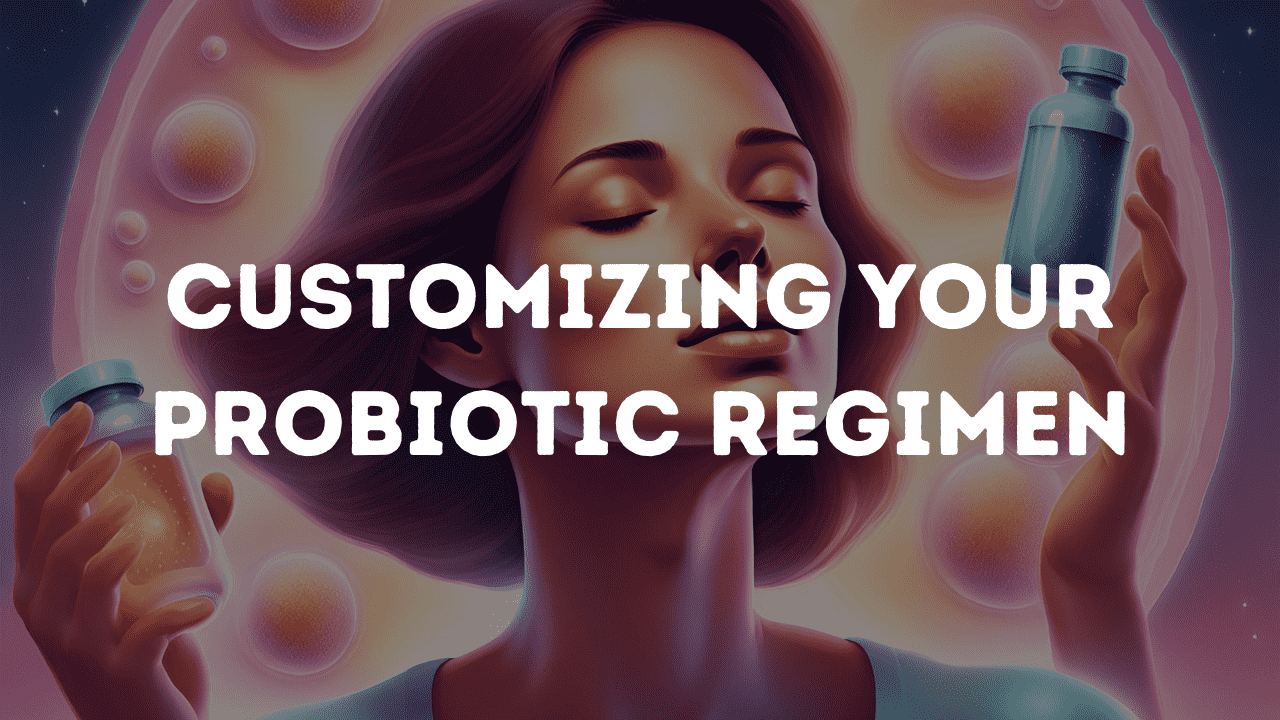
The last step to boost your gut health by 500% is to customize your probiotic regimen according to your individual needs and health conditions. There is no one-size-fits-all approach to probiotics, as different people may have different gut microbiomes, different health goals, and different responses to probiotics.
Personalized Probiotics
Personalized probiotics are probiotics that are tailored to the specific characteristics and needs of the user, based on factors such as:
- Age: Age can affect the composition and function of the gut microbiome, as well as the susceptibility to various diseases and conditions. For example, infants and elderly people may have less diverse and less stable gut microbiomes, and may benefit from probiotics that can enhance their immune function and prevent infections and inflammation.
- Gender: Gender can also affect the composition and function of the gut microbiome, as well as the risk of certain diseases and conditions. For example, women may have more diverse and more fluctuating gut microbiomes, and may benefit from probiotics that can prevent and treat vaginal infections and urinary tract infections, as well as improve hormonal balance and mood.
- Diet: Diet can have a major impact on the composition and function of the gut microbiome, as well as the health outcomes of the user. For example, people who consume a high-fat, high-sugar, low-fiber diet may have a less diverse and less healthy gut microbiome, and may benefit from probiotics that can improve their digestion, metabolism, and inflammation.
- Lifestyle: Lifestyle can also influence the composition and function of the gut microbiome, as well as the well-being of the user. For example, people who are physically active, non-smokers, and moderate drinkers may have a more diverse and more resilient gut microbiome, and may benefit from probiotics that can enhance their energy, endurance, and recovery.
- Health Status: Health status can determine the need and suitability of probiotics for the user, as well as the potential benefits and risks of probiotics. For example, people who have digestive disorders, such as irritable bowel syndrome, inflammatory bowel disease, or diarrhea, may benefit from probiotics that can improve their symptoms, quality of life, and gut microbiome. However, people who have immune disorders, such as HIV, AIDS, or cancer, may need to be cautious with probiotics, as they may pose a risk of infection or adverse reactions.
Consulting a Healthcare Professional
The best way to customize your probiotic regimen is to consult a healthcare professional, such as a doctor, a nutritionist, or a pharmacist, who can assess your health status, your health goals, and your probiotic needs. A healthcare professional can:
- Perform tests and analyses to evaluate your gut microbiome, such as stool samples, breath tests, or blood tests, which can reveal the diversity, richness, and function of your gut microbiome, as well as the presence of any pathogens or imbalances.
- Recommend the best probiotic strains, doses, and formulations for your needs and goals, based on the scientific evidence and the health claims of the probiotic products, as well as your personal preferences and tolerability.
- Monitor your progress and response to the probiotic regimen, such as your symptoms, your quality of life, and your gut microbiome, which can help to adjust or optimize your probiotic regimen, as well as to identify and prevent any potential side effects or interactions.
Conclusion
Gut health is not just about digestion. It is also linked to your immune system, your mood, your brain function, and your overall well-being. Probiotics are live microorganisms that can improve your gut health by balancing your gut microbiome, the community of bacteria and other microbes that live in your intestines.
However, not all probiotics are the same, and not all times are ideal for taking them. In this article, you learned about the optimal timings for taking probiotics to achieve a 500% boost in gut health. You also discovered how to enhance your probiotic absorption, how to customize your probiotic regimen, and how to incorporate lifestyle factors that support a healthy gut.
By implementing the insights and tips gained from this article, you can revolutionize your gut health and your overall well-being. You can experience improved digestion, immunity, metabolism, mood, cognition, and behavior. You can also prevent or treat various diseases and conditions, such as irritable bowel syndrome, inflammatory bowel disease, diarrhea, constipation, allergies, asthma, eczema, depression, anxiety, and autism.
So, what are you waiting for? Start your probiotic journey today and unleash the power of your gut!
